Zooming - December 2013
/The ‘zooming’ post for December includes pieces of Florida pictures (the first 5) and then pictures from Brookside (outdoors and inside the conservatory).
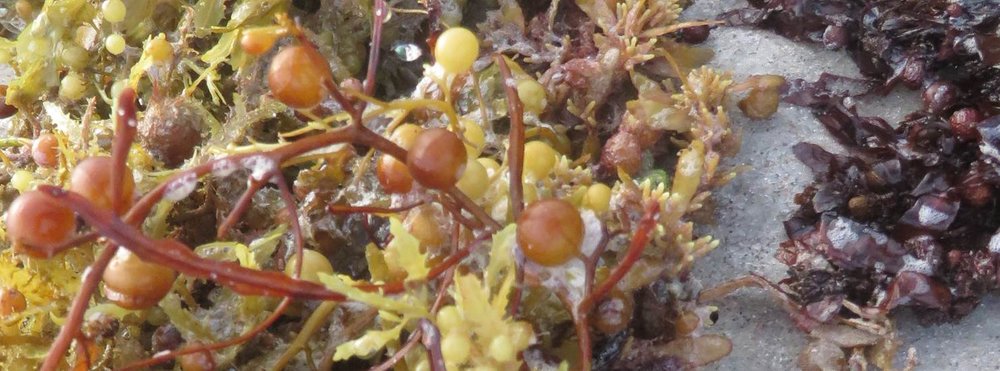
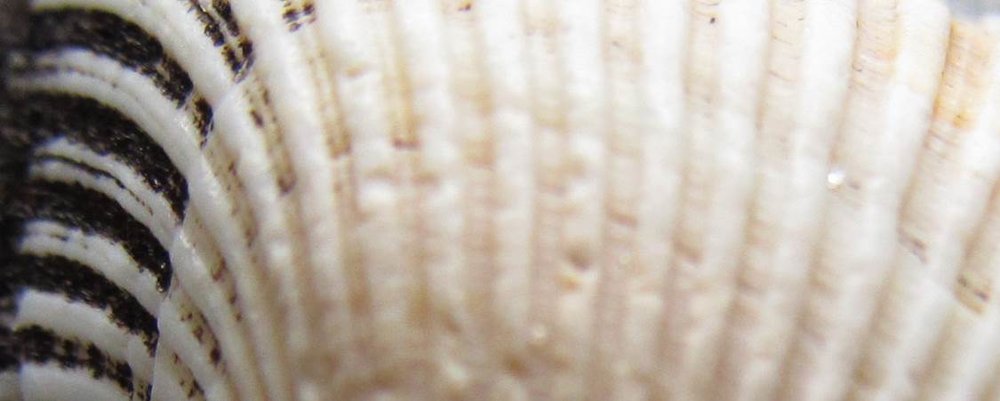

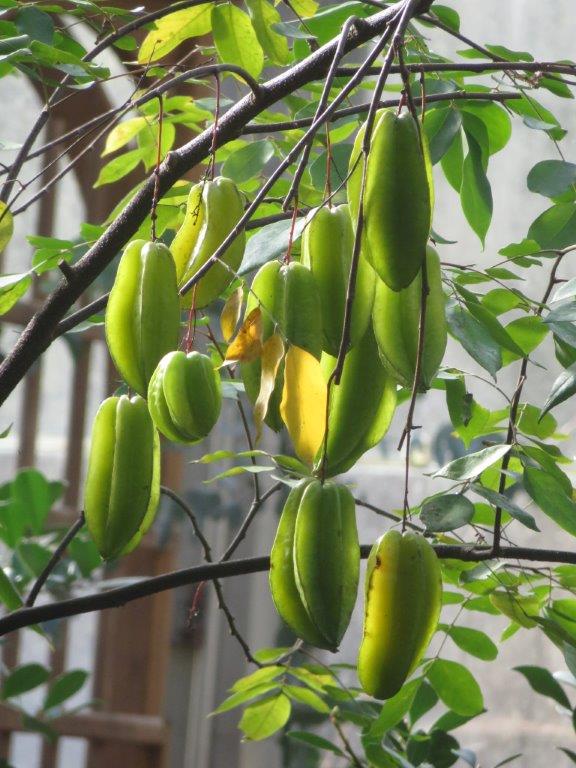

Brookside Gardens is the place for an evening walk through garden themed lights in December. I was there on a cold but sunny day when snow was still on the ground. The conservatory was lush with tropical plants (star fruit, bird of paradise, poinsettias, and bananas) and the model train display.
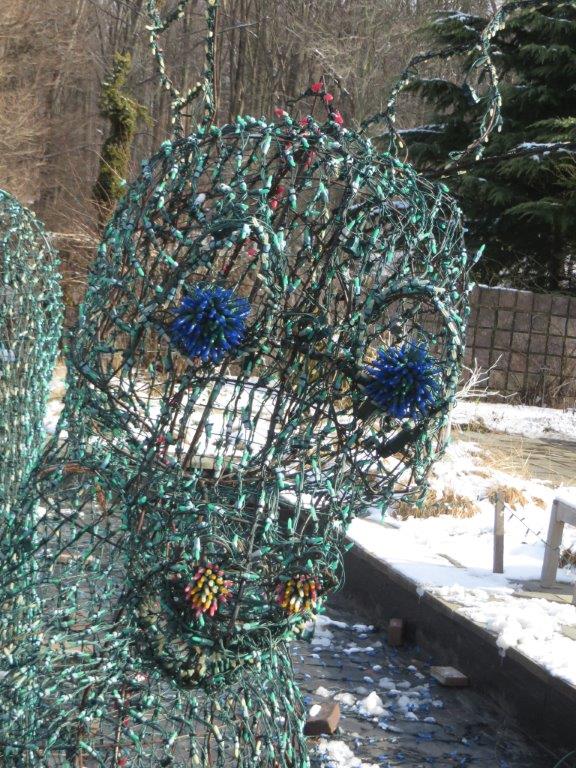
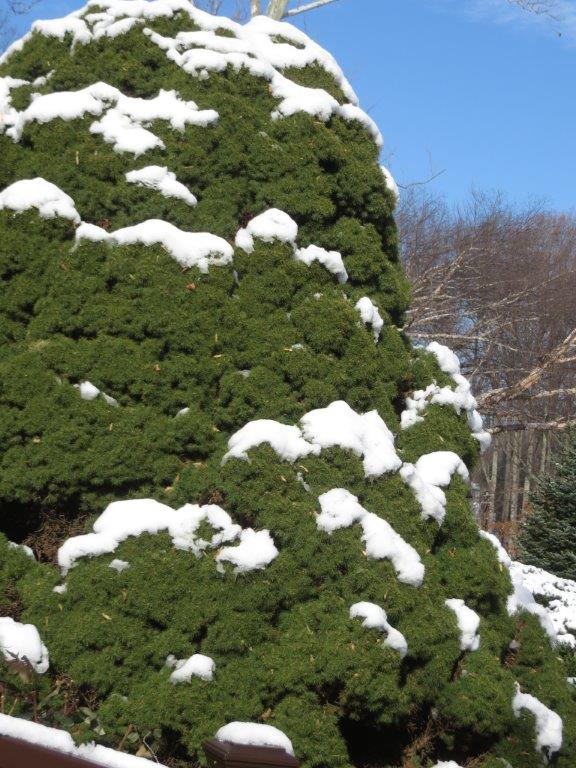
Outside, the dragon of lights looked relatively tame in the brightness of day and snow clung to the evergreens - and on some of the artificial flowers created with lights. There was a black squirrel sorting through the leaf litter. The Children’s Garden was cherry with colored lights on the white picket fence - but it was too cold to stay for long. There were very few people in the outdoors of the garden and the ones that were moved quickly along the path. It was a day for a brisk walk - or none at all.

I posted about the tower at the Bok Tower Gardensyesterday. Today the focus is on the plants and a few animals. Lizards seemed to be everywhere and it was warm enough for them to be very active.

The squirrels were acclimated to people. This one listened to the carillon concert with us - keeping his back to us as he perched on a neighboring bench.
The slide show below shows a number of other features in garden: a metal Venus flytrap sculpture among tropical vegetation, oranges glowing in the sun, bees on an agave flower, a Monarch butterfly on orange and red flowers, coral stones used for paving with moss growing in larger indentions, a pineapple type plant, a spider web, the center of a cycad.
Milkweed is one of my favorite plants. The globes of the flowers smell very sweet in the spring - they are full of flying insects. In the summer, I check the leaves for Monarch butterfly eggs and caterpillars. And in the fall the seed pods burst open and the seeds float away with each breeze.
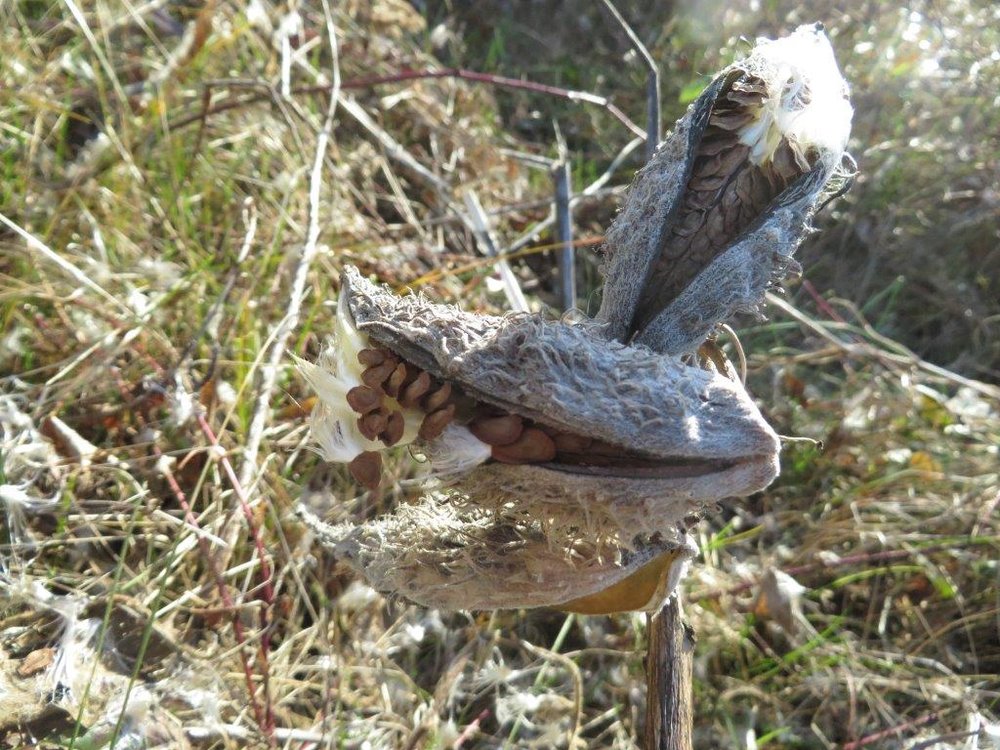
When the pods first begin to spilt, the tightly arranged seeds are visible inside.
And then the unfurling begins - slowly at first.
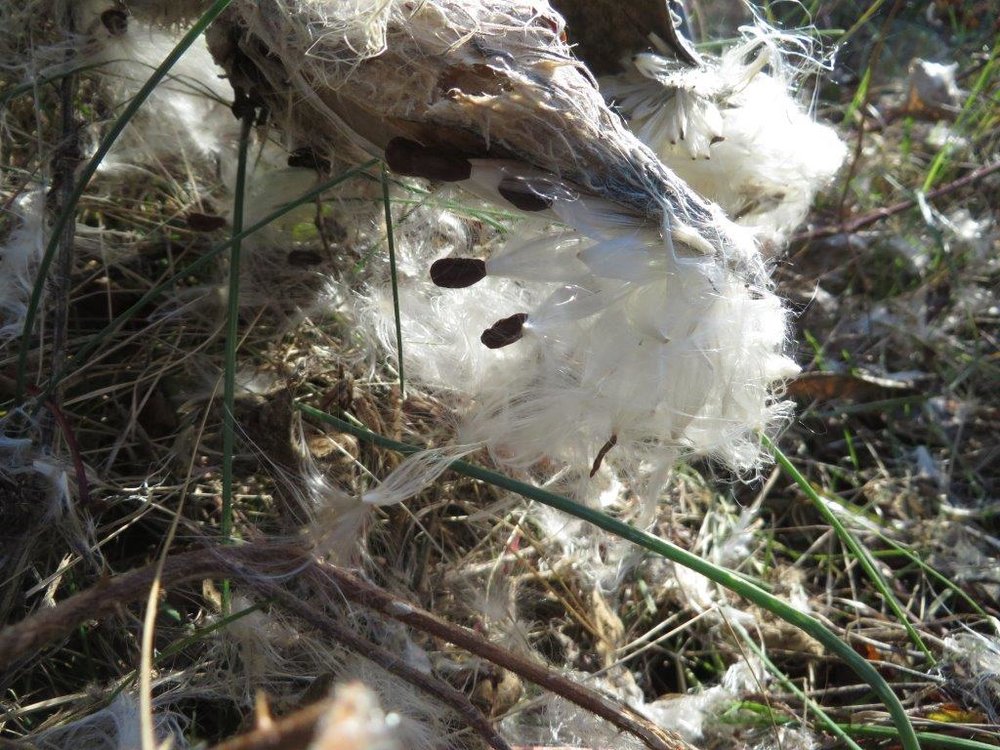
Sometimes the two halves of the pod stay tight and the brown seeds with their white fiber parachutes arch around the pod.
Once they are far enough out of the pod, each little breeze takes more of them away.
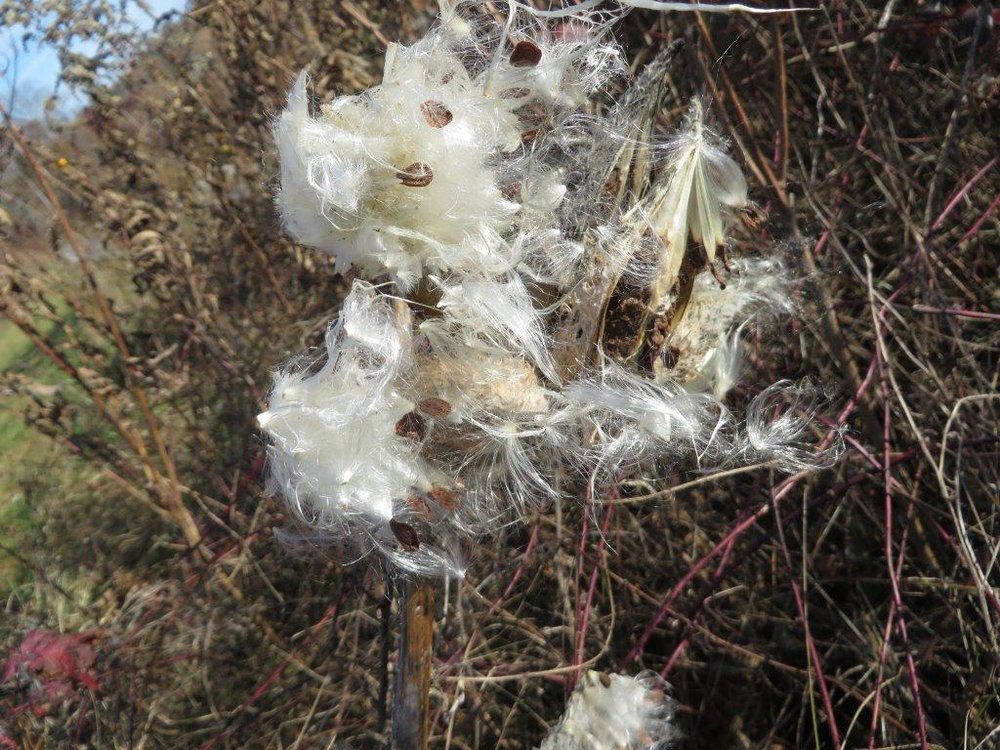
Eventually the pods are almost invisible in the mass of seeds and white fiber
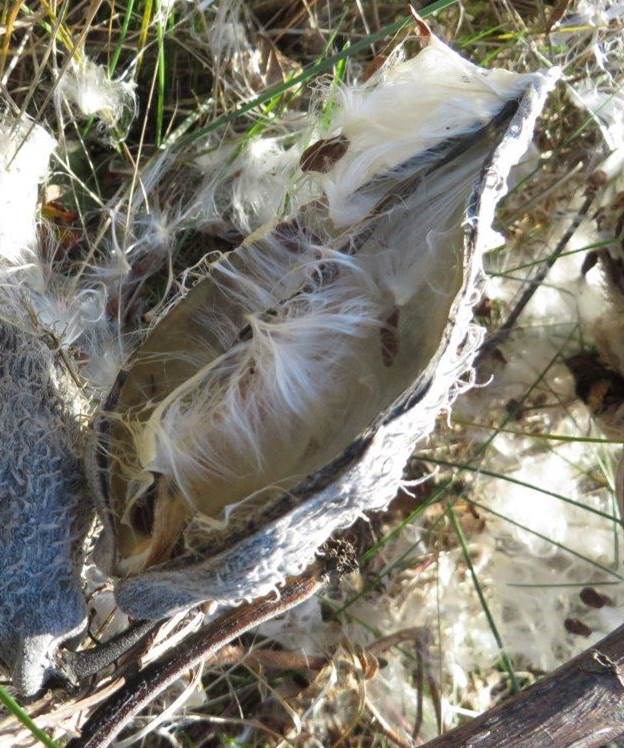
And then the pods become empty - cleaned out,

And the seeds are wherever the wind took them.
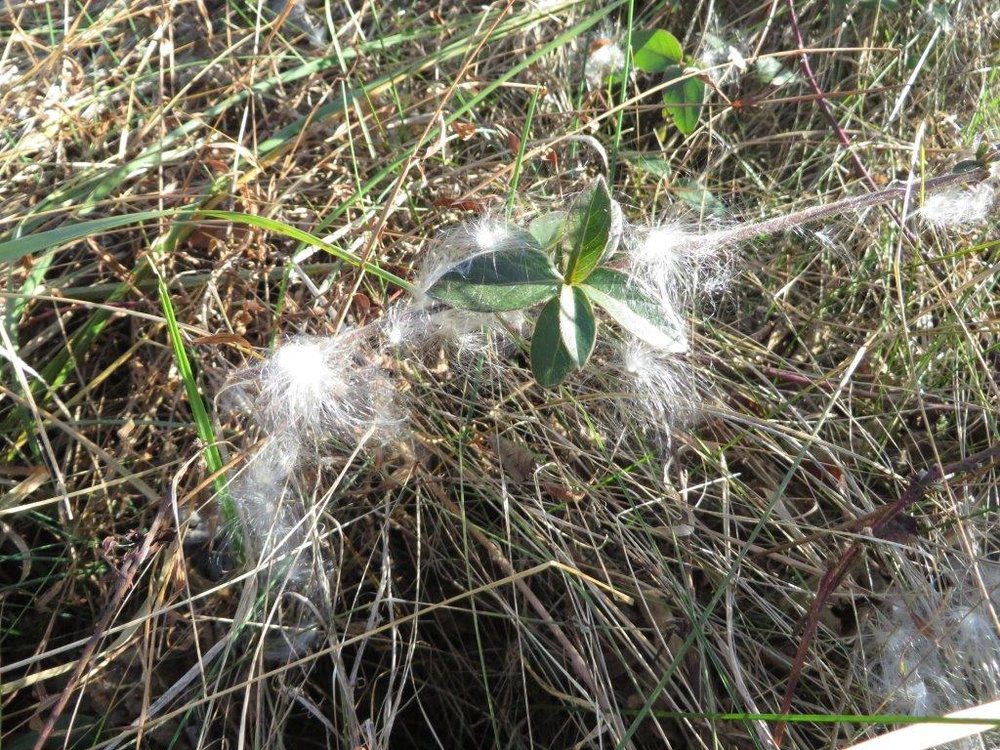
Sometimes the white fiber stays with the seed and sometimes the seed detaches while the fluff continues on.

The colors of autumn leaves are the best part of the fall season - it’s like a last hurrah before the drabness of winter sets in. I’ve taken several walks this fall close to my home in Maryland. It has not been the best year for fall color but there has been enough to collect up some favorite images for this post. It’s almost impossible to pick a favorite vista:
The red maple against the sky,
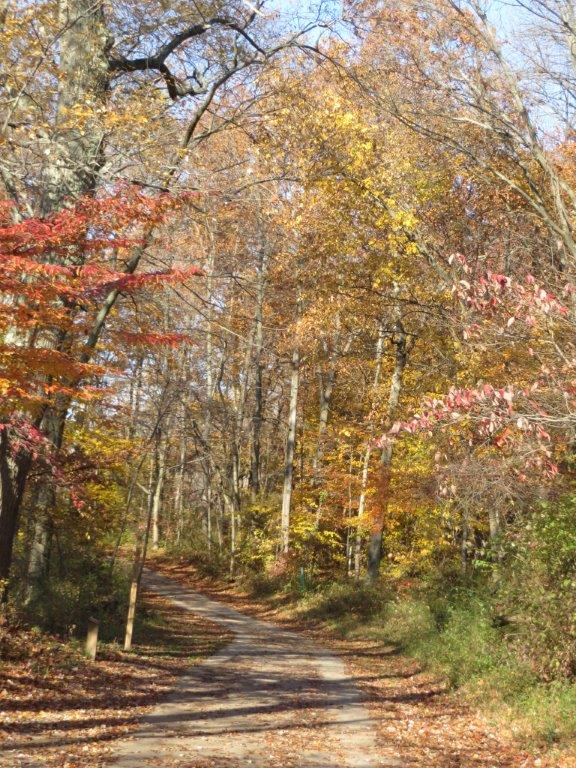
The leaf strewn path,
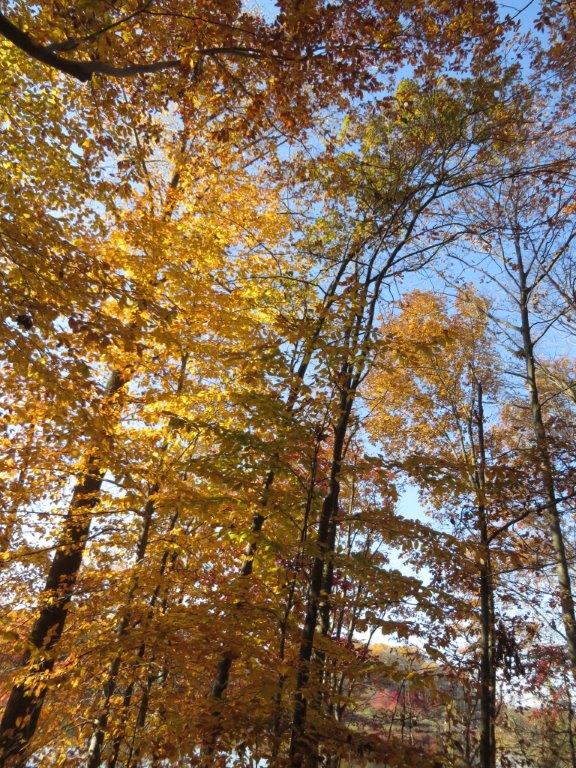
Looking up through the tall trees toward the sun-filled sky,

One tree containing all the colors of autumn,

And a tall gingko just beginning to turn yellow with wisps of clouds overhead.
Of course the leaves are also beautiful if you look more closely too. I’ve grouped some of my favorites into the slide show below.
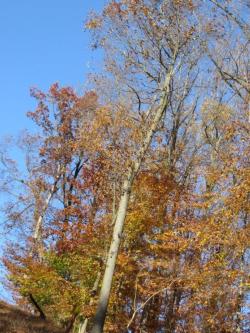 I joined a group to hike from the Howard County Conservancy’s Mt. Pleasant Farm to the Patapsco River (Patapsco Valley State Park). We hiked along the farm's cut grass trail, then through a field of cut hay…to the forest.
I joined a group to hike from the Howard County Conservancy’s Mt. Pleasant Farm to the Patapsco River (Patapsco Valley State Park). We hiked along the farm's cut grass trail, then through a field of cut hay…to the forest. 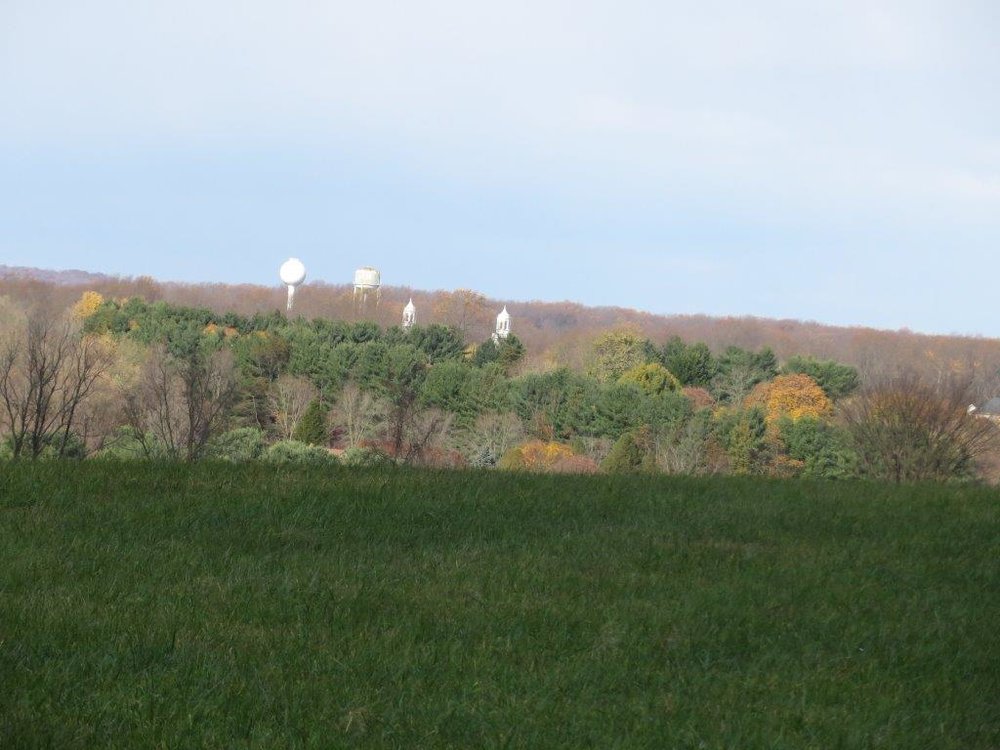
A stone marker from 1800 shows the boundary of the Mt. Pleasant Farm.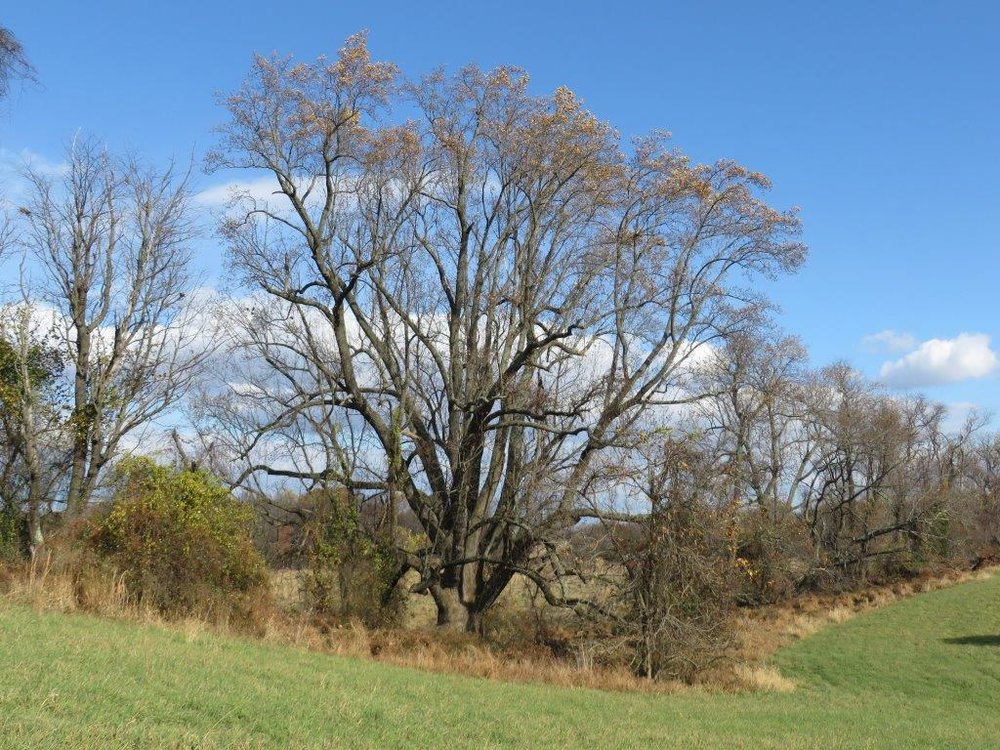

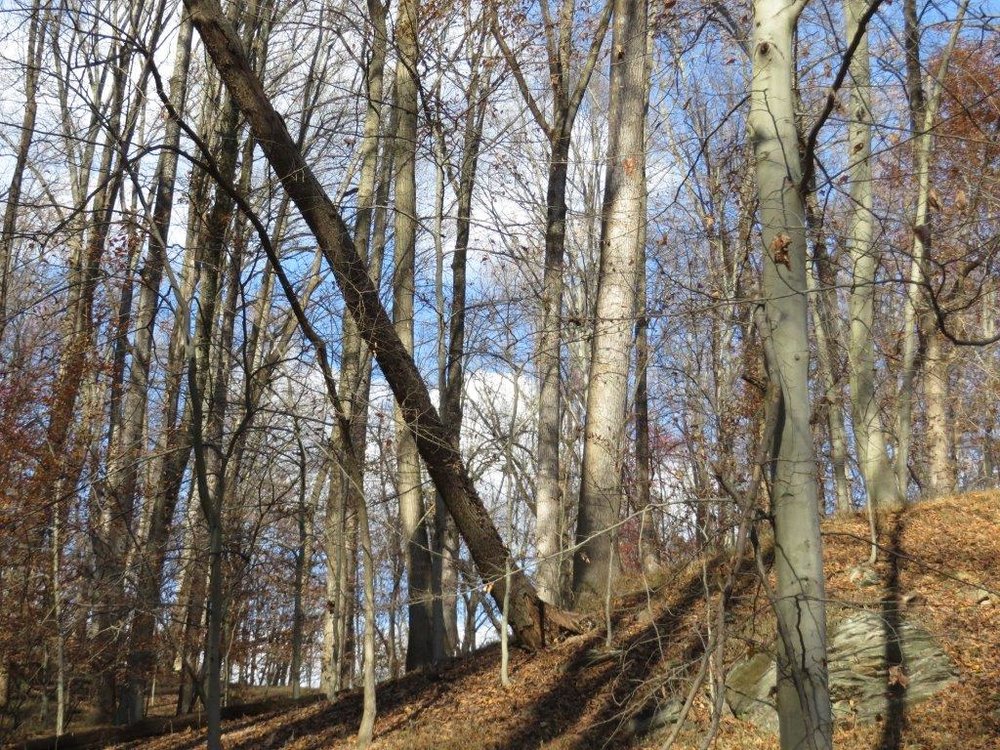 The undulations of the path took us up and down but averaged ‘down’ on the way to the river and ‘up’ on the way back.
The undulations of the path took us up and down but averaged ‘down’ on the way to the river and ‘up’ on the way back.
The leaves had fallen - obliterating the trail and smaller fallen limbs. We scrambled over larger deadfall and churned the deep leaf mulch on the inclines. The moss was so green against the dulling brown of the leaves that it sometimes seemed to glow. In fact - any bit of green is eye catching in the late fall forest.
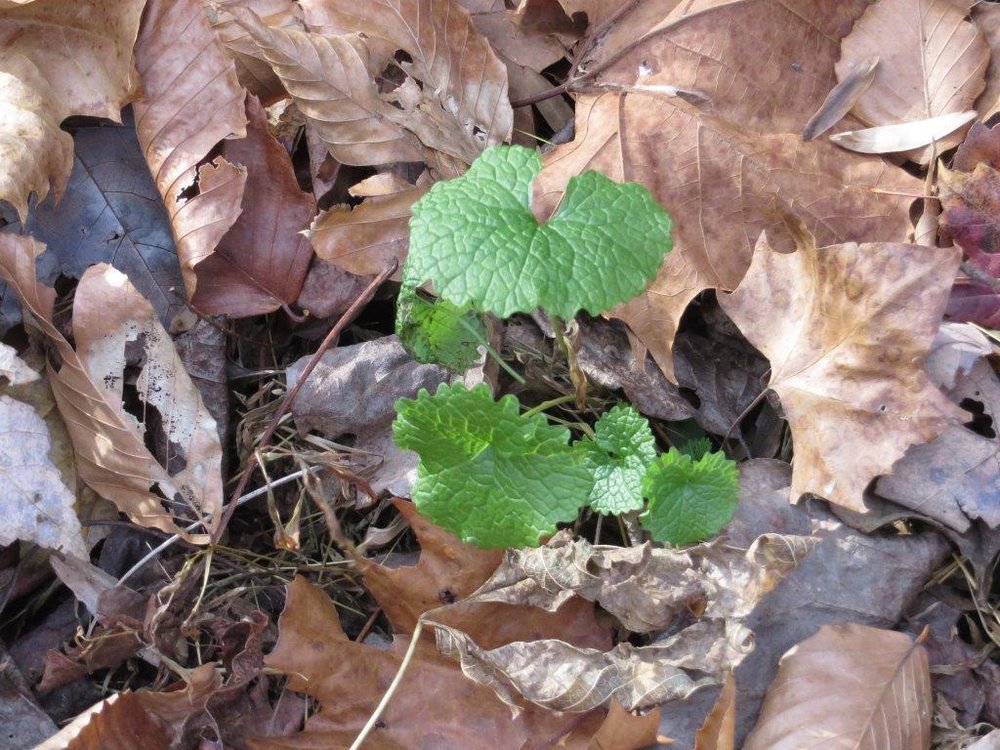
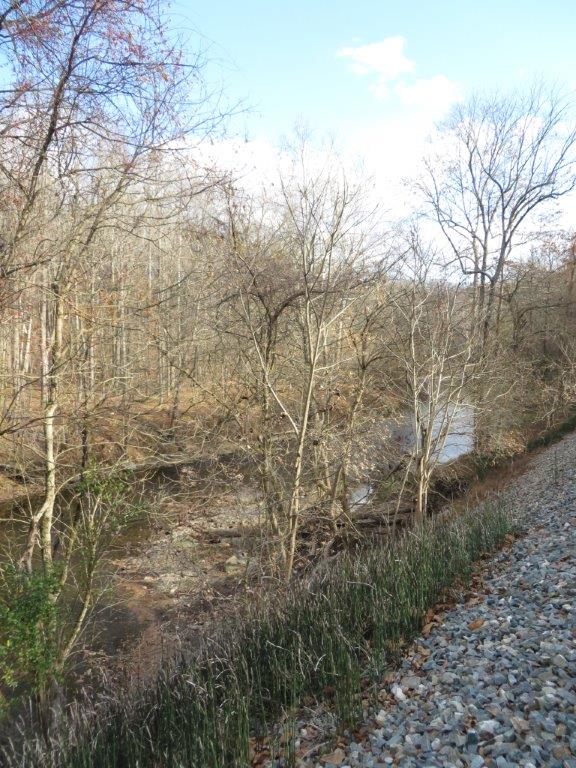 The river view was on the other side of railroad tracks. We listened for a train whistle but only a maintenance vehicle came along the track while we were there. Horsetails grew through the rocks of the rail bed on the river side. Sycamores grow along the river - taking on their white ‘ghost tree’ look of winter now that their leaves were gone.
The river view was on the other side of railroad tracks. We listened for a train whistle but only a maintenance vehicle came along the track while we were there. Horsetails grew through the rocks of the rail bed on the river side. Sycamores grow along the river - taking on their white ‘ghost tree’ look of winter now that their leaves were gone.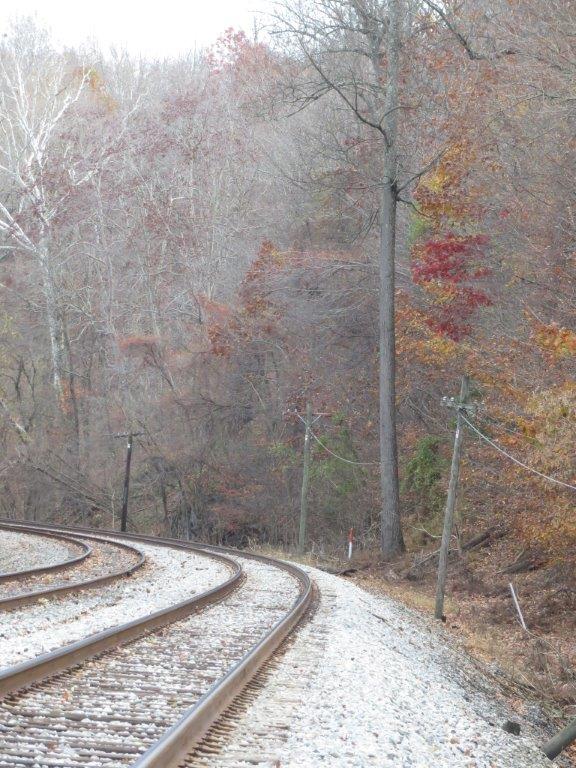
There were a few examples of shelf fungus that I noticed on the hike back.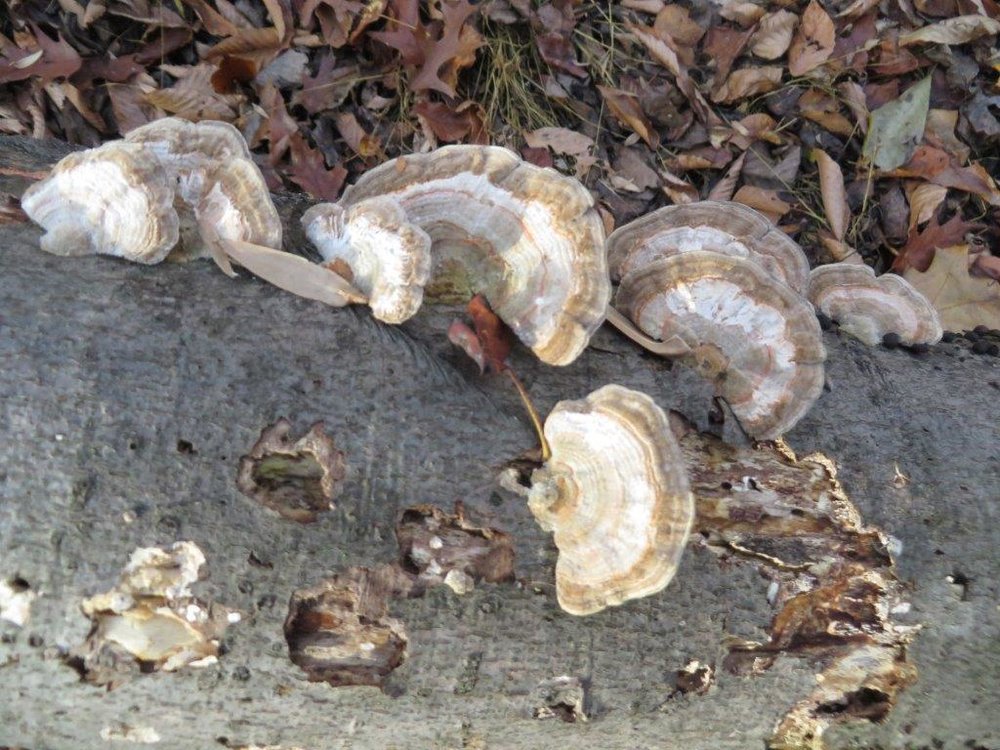
The beech trees with their smooth bark were the most frequent tree along the streams down to the river. Some of the trees still held a few leaves. I like the look of the tree trunks of varying sizes in the forest nearly devoid of foliage.
The ‘zooming’ post for November includes things seen on a fall hike: leaves, milkweed seeds, and a mushroom cap. Enjoy!
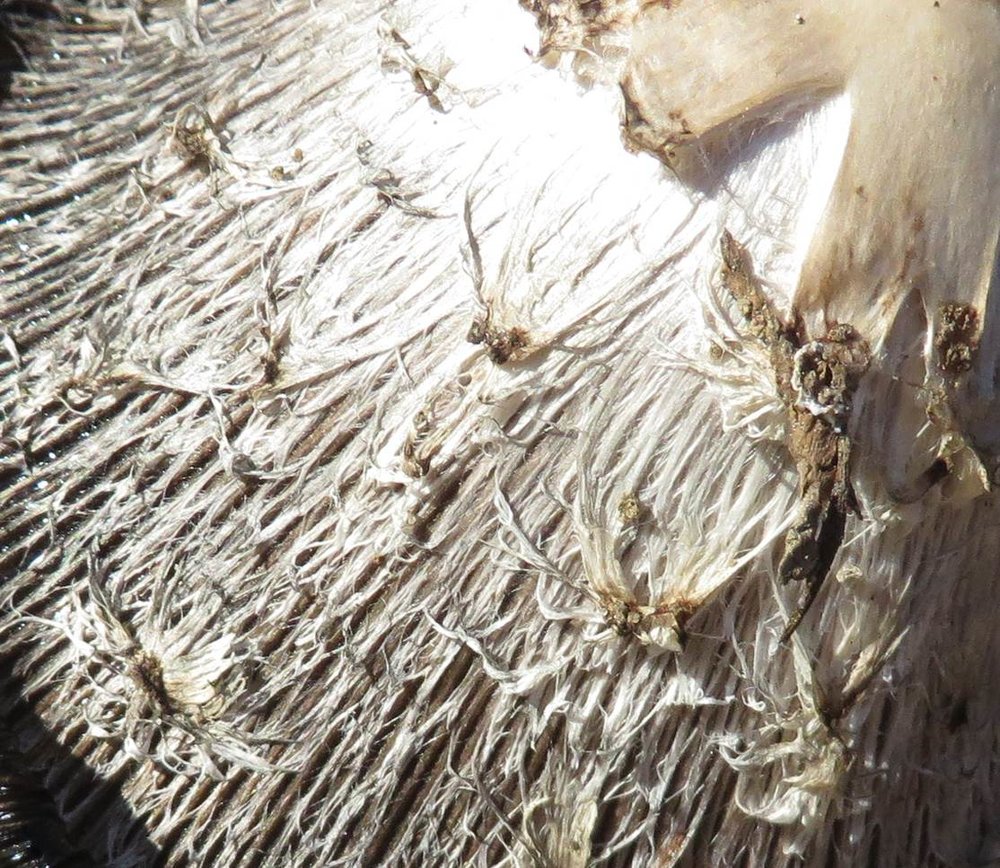
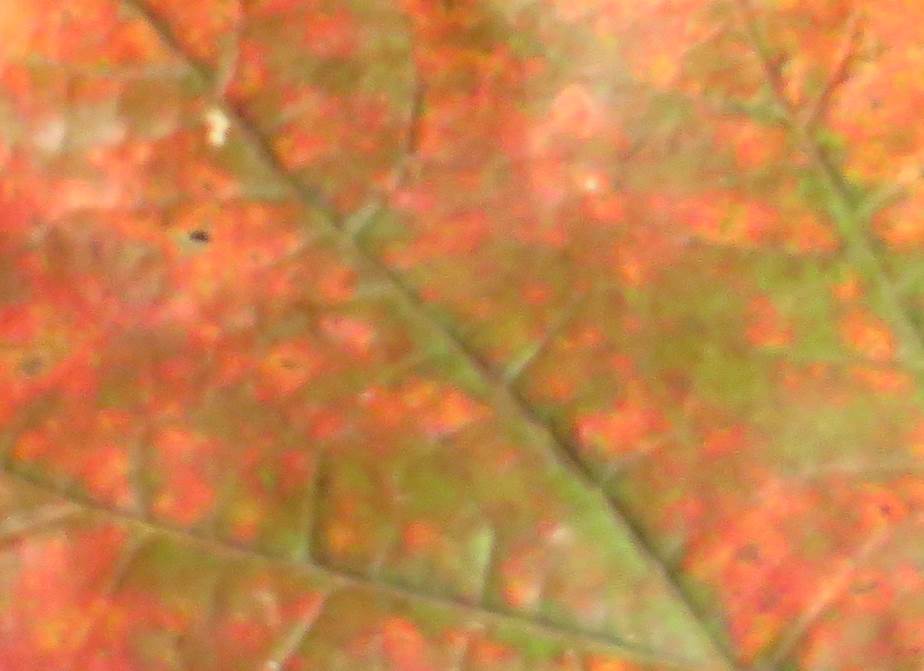
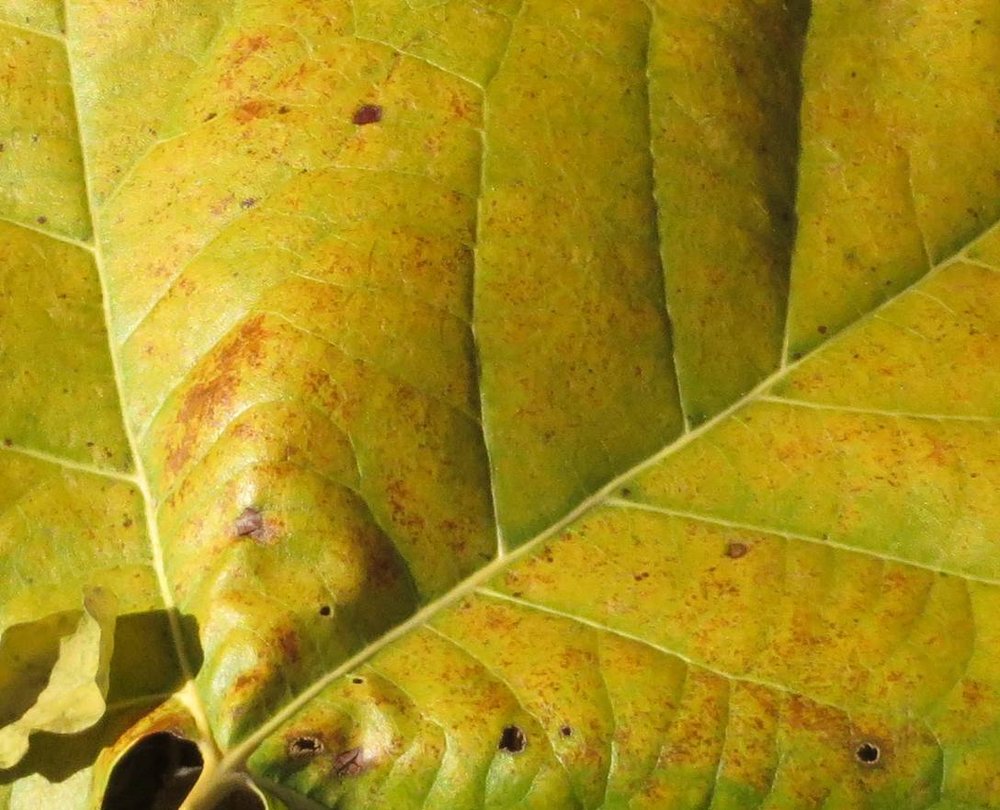
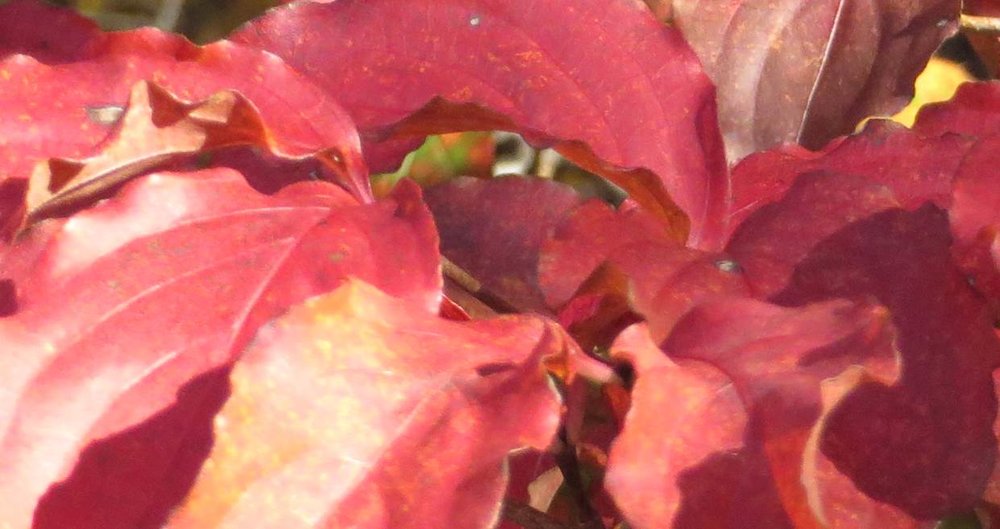

Butler Wash Ruin is a short walk through washes and across slickrock to an overlook of the ruin. It was a cool day in early October when we were there. The lower part of the ruin was obscured by trees but the ruins in the cliff face were unobscured. The people that lived here had used every space the cliff provided for storage or housing. The area of the ruins looked like an oasis compared to the mostly rocky area of the mesa top. Where dirt accumulated on the slickrock, flowers were blooming; there must have been some recent rains and the fall temperatures meant that the moisture did not bake away immediately.
There was a good ‘feel’ to the place. The climate in southeastern Utah would have always been challenging - but this place must have provided a measure of stability for the people that inhabited it. They found what they needed.
The items below were ‘the cream’ of the articles and websites I found this past week. Click on the light green text to look at the article.
Cool Plants for Kids: 8 that Explode, Eat Bugs, or Stick to You - Cool plants for more than just kids: puffballs, jewelweed, beaked hazelnut, pitcher plants (below), sundew, burdock, beggarticks, Norway maples.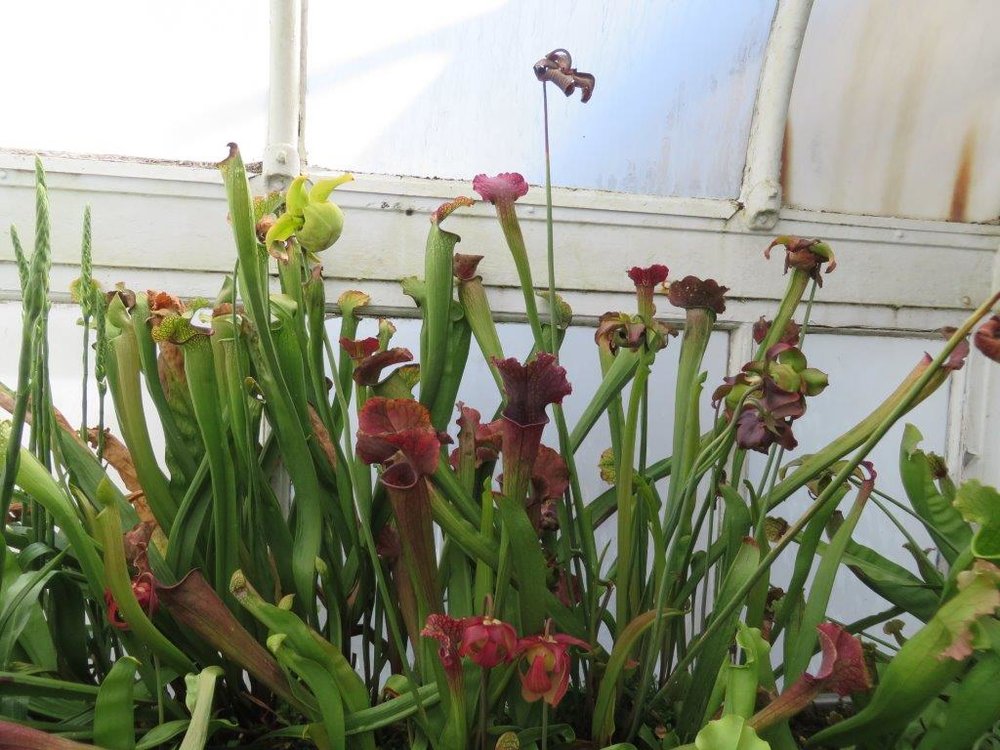
London’s Wasted Heat - It’s intriguing to realize that there are places in London - and probably most cities - where heat could be used rather than vented. The trend should be toward ‘less waste’ and this is certainly one area that could be worth pursuing.
US Preterm Birth Rate Drops to 15-Year Low - But the US still gets a ‘C’ grade when it comes to preterm birth rates. It’s very sad for the individual children fighting to overcome the impact of preterm birth and preterm births cost about 12 times more than an uncomplicated healthy birth. For the report card for each state - see the March of Dimes site.
Top 25 Wild Bird Photographs of the Week #51 - I always like the collections of bird photographs. My favorite in this batch is the common kingfisher with outspread wings….but I also enjoyed how many of the birds in this set were finding something to eat.
Norwegian Vikings Purchased Silk from Persia - Trade has been going on for a long time….sometimes longer than our ‘history’ has realized.
 9 ways mushrooms could drastically improve the world - From a TED talk by Mohamed Hijri
9 ways mushrooms could drastically improve the world - From a TED talk by Mohamed Hijri
Breathtaking Autumn Colors Viewed Atop Oberg Mountain - These image from Minnesota were posted in early October….I just got around to taking a look at them.
Saharan Star Dunes - These dunes are formed when the wind changes directions…swirling.
US Cities In Which The Fewest People Drive To Work - Biking…walking…mass transit - is it a surprise that New York, Washington DC, Boston and San Francisco are at the top of the list?
Gartner's dark vision for tech, jobs - The upcoming wave of machines replacing people now is entering into Gartner’s projections….it is within the near term rather than outside the span of our lifetimes.

Brookside Gardens was full of fall last weekend - colorful foliage and the display of mums in the conservatory. I was a little disappointed that they did not have pumpkins and gourds on display as they have in the last few years - but it was interesting to see the preparations for the lights in the gardens that begin at Thanksgiving.

Indoors there is always the draw of lush tropical foliage in the conservatory and the literate frog sculpture in the visitor center.
Outdoors the colors of fall abound - with some of the trees completely changed (like the dogwood) and some still mostly green (like the ginkgo).
And take a look at both directions from the entrance bridge of the conservatory parking lot:
Of course there was more...so the rest of my photo picks from my October walk around Brookside Gardens is in the slideshow below.
The ‘zooming’ post for the month has become one of my favorite posts to create. I enjoy selecting the images and getting them clipped perfectly…the arranging them in the post. My picks from my October photographs are below.



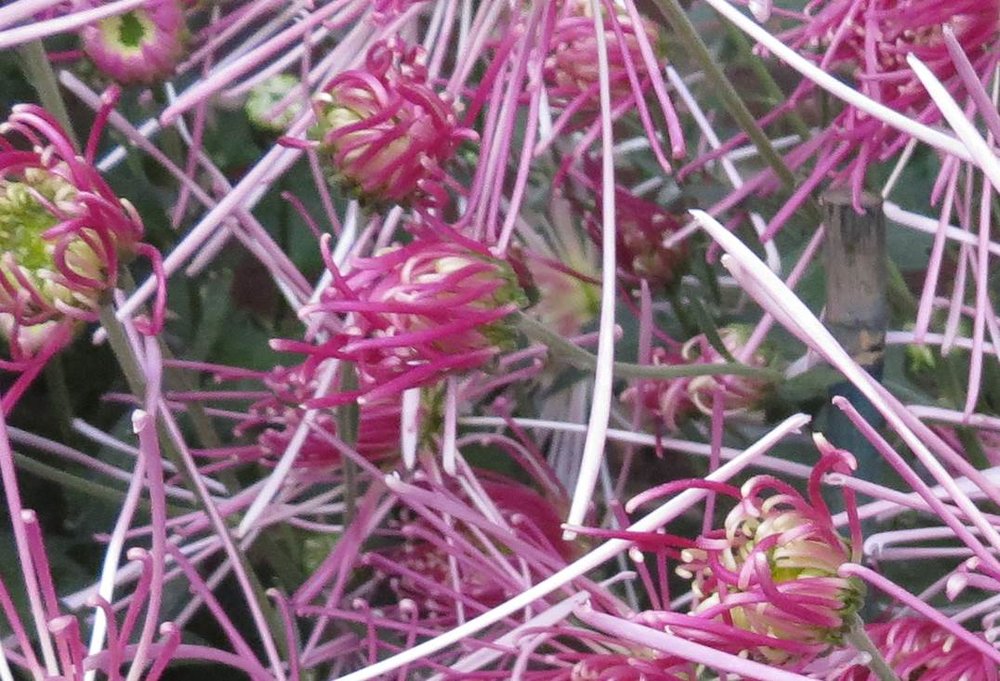
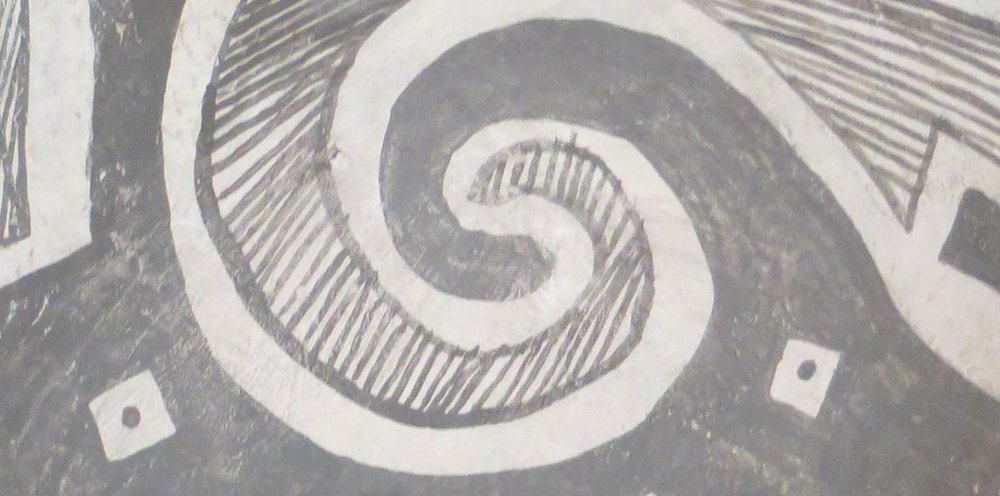


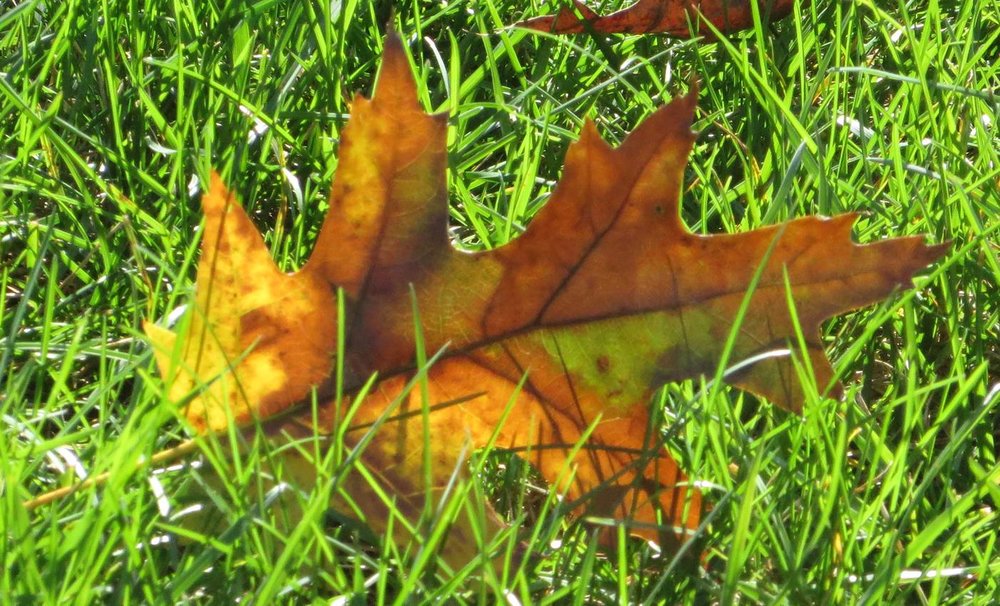
 Our Maryland fall has been muted this year. Most of the trees have not achieved the brilliant colors of years past; the few that do are flashes of brilliance that provide a splash of color for a few day and then drop all their leaves to the ground. I find myself appreciating the play of light through oak leaves this year and the splotches of color on maple leaves that fill a tree that looks ‘green’ from a distance.
Our Maryland fall has been muted this year. Most of the trees have not achieved the brilliant colors of years past; the few that do are flashes of brilliance that provide a splash of color for a few day and then drop all their leaves to the ground. I find myself appreciating the play of light through oak leaves this year and the splotches of color on maple leaves that fill a tree that looks ‘green’ from a distance.
 The front flower bed is mostly gone to seed. I haven’t seen the birds easting the seeds of the blazing stars but the bare rib of some of the seed plums is evidence that the feast is not going totally unnoticed. We’ve had freezing temperatures for the past few mornings but there is still a dahlia blooming - resting on the sidewalk that probably retains enough heat to keep it warm.
The front flower bed is mostly gone to seed. I haven’t seen the birds easting the seeds of the blazing stars but the bare rib of some of the seed plums is evidence that the feast is not going totally unnoticed. We’ve had freezing temperatures for the past few mornings but there is still a dahlia blooming - resting on the sidewalk that probably retains enough heat to keep it warm.
 The tulip poplars are losing their leaves and their seeds without becoming the blaze of yellow. They tower over our yard and their leaves wave in the wind….and whirl away.
The tulip poplars are losing their leaves and their seeds without becoming the blaze of yellow. They tower over our yard and their leaves wave in the wind….and whirl away.
Last but not least - the onion seeds are scattering as the wind shakes them like at rattle out of their cases. I hope some of them come up next spring as new plants.
It’s time again for the monthly post about eBooks that are freely available on the Internet. The three below are my favorites for October 2013.

Mollhausen, Balduin. Reisen in die Felsengebirge Nord-Amerikas Bd. 1. Leipzig: H. Constenoble. 1861. Available from the Internet Archive here. The images of the desert southwest that were published in 1861 are full of plants that are (mostly) realistically portrayed.

Macbeth-Evans Glass Company. Shades and Globes. Pittsburgh: Bartlett-Orr Press. 1912. Available from the Internet Archive here. This catalog from the early 1900s has some appealing ‘shades and globes’ for light fixtures that would not look out of place in a home today. I like the iridescent glass and the pattern of the one I clipped for this post.

Wittmack, L. Gartenflora Bd. 42. Berlin: Verlag von Paul Parey. 1893. Available from Internet Archive here. I am still savoring the volumes of Gartenflora ---- going through a few more each month. The chrysanthemum was one of my favorite images from October.
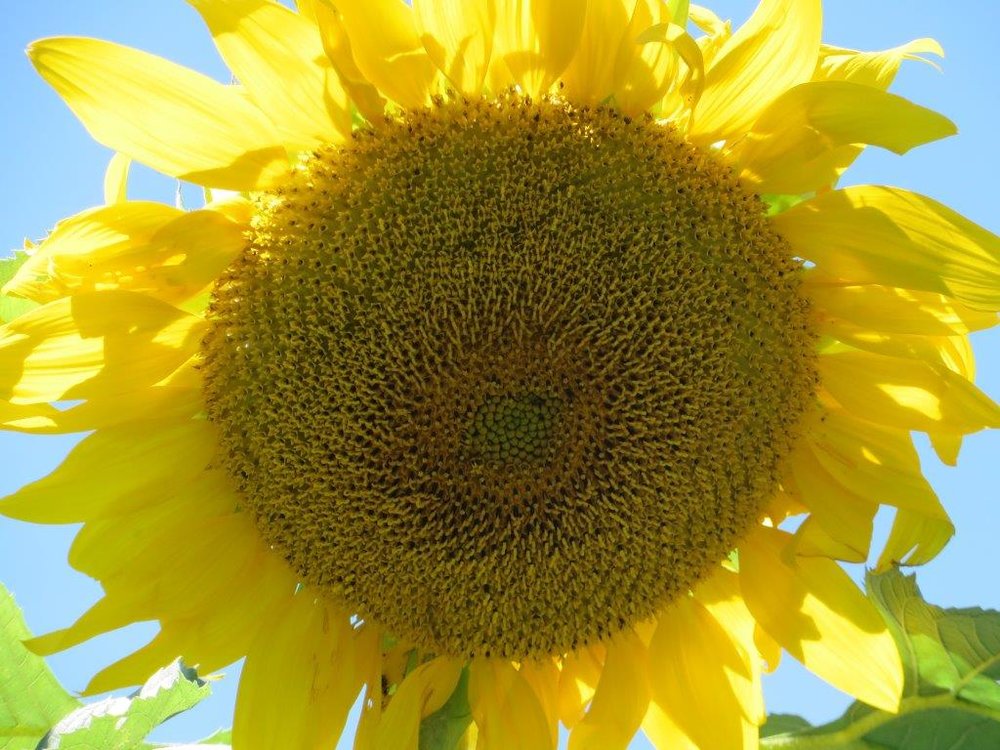
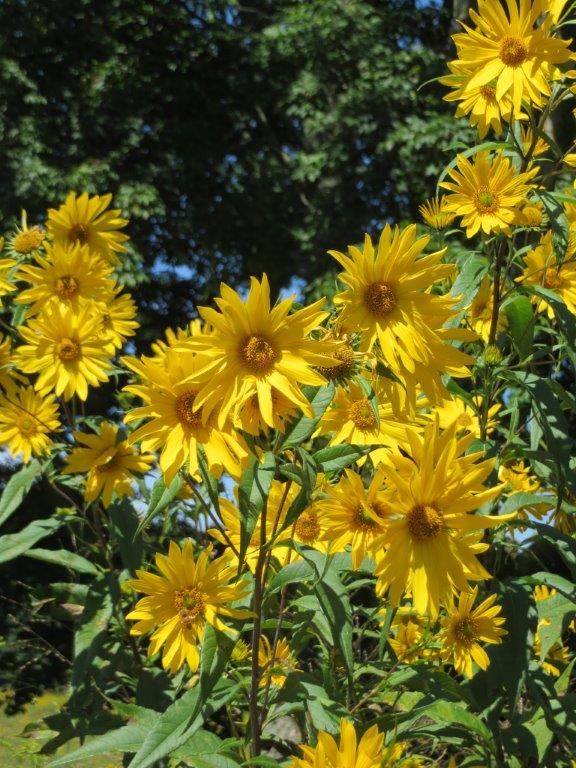
Sunflowers in the sun! They are one of my favorites for late summer and into fall. The sunflowers pictured in this post were at Longwood Gardens in September. The large headed one was in a demonstration garden and the smaller ones were at the edge of the meadow (closed for renovation and expansion).
The group of flowers I spent the longest time watching had gone to seed and birds were enjoying their bounty.

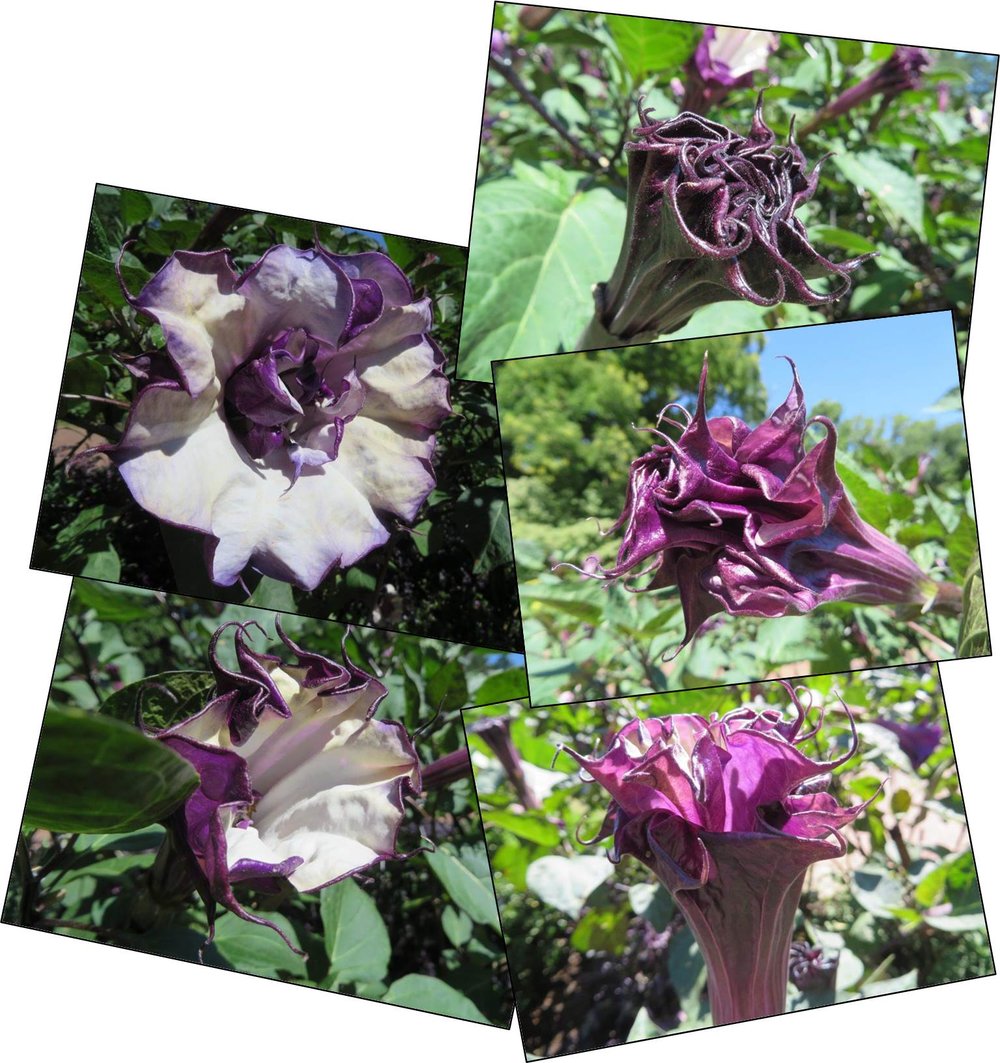 Datura was in full bloom at Longwood Gardens in September. The large trumpet flowers sometimes seem very delicate - and other times frilly. As buds - still compact - they appear waxy. On some varieties, the flowers hang downward and sway like bells in the breeze; other varieties have flowers that point upward showcasing all their layers. Enjoy the collages I made for the purple, pink and yellow daturas.
Datura was in full bloom at Longwood Gardens in September. The large trumpet flowers sometimes seem very delicate - and other times frilly. As buds - still compact - they appear waxy. On some varieties, the flowers hang downward and sway like bells in the breeze; other varieties have flowers that point upward showcasing all their layers. Enjoy the collages I made for the purple, pink and yellow daturas. 
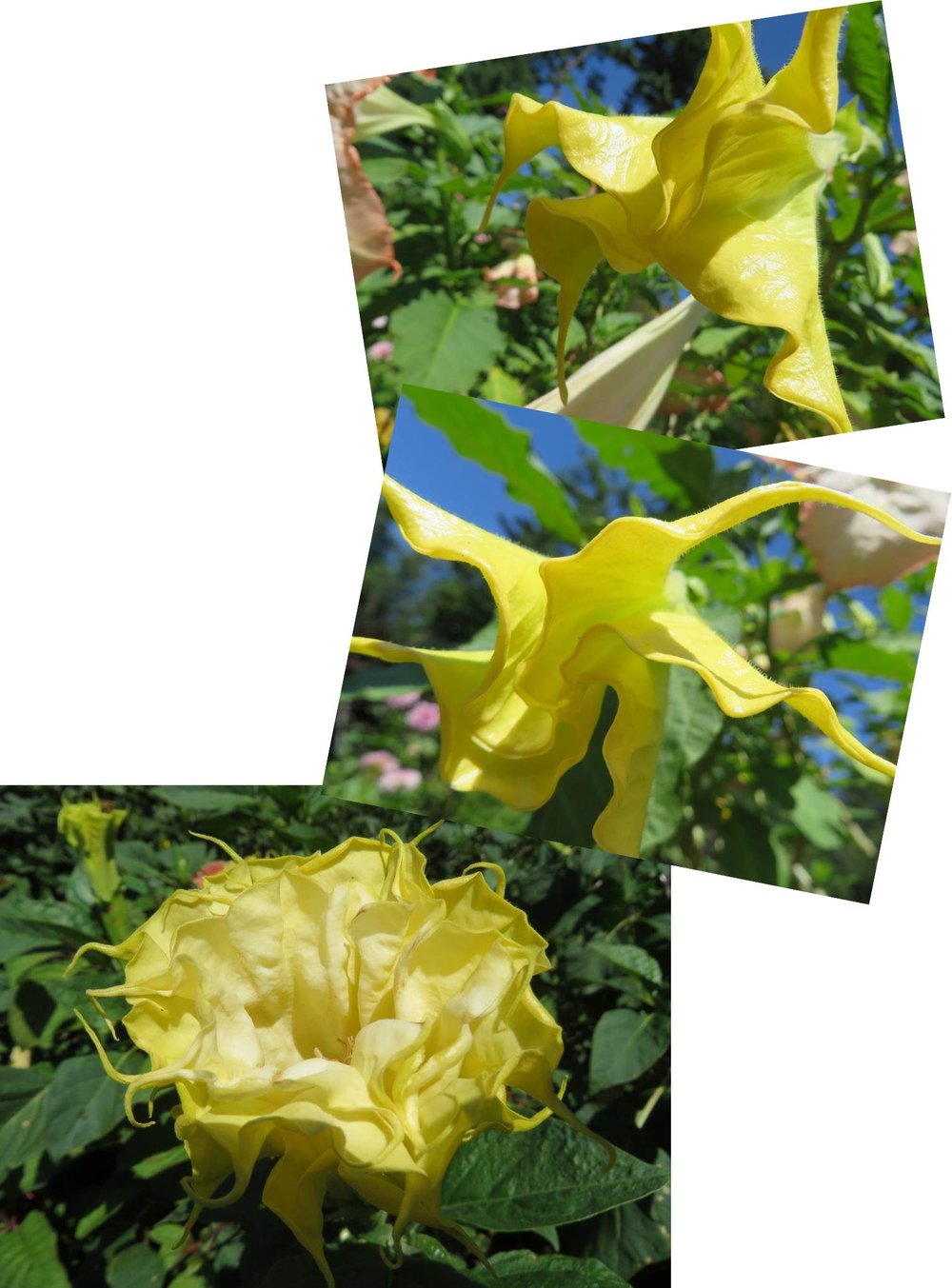

The water features at Longwood Gardens are an integral part of the gardens during the warmer months. Sometimes my favorite is the Main Fountain Garden. We have often stayed for the lights on the water on summer evenings so I find them less exciting during the day.
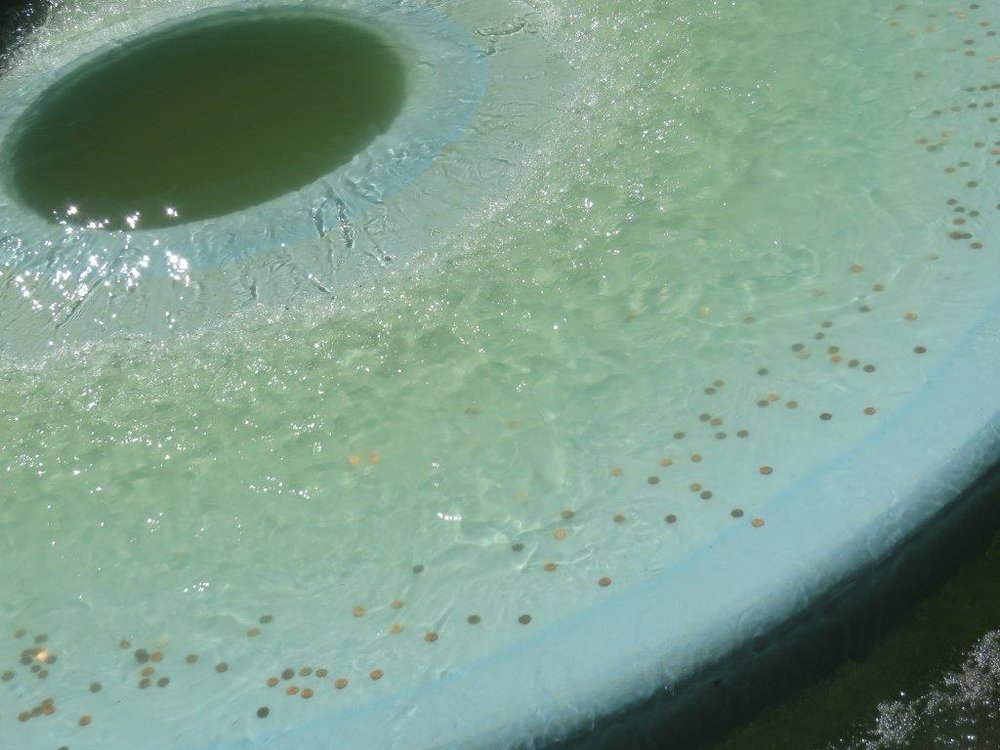
Other times the Eye of Water is my favorite just because of the sheer volume of water flowing over the structure and then downhill toward the Chimes Tower.
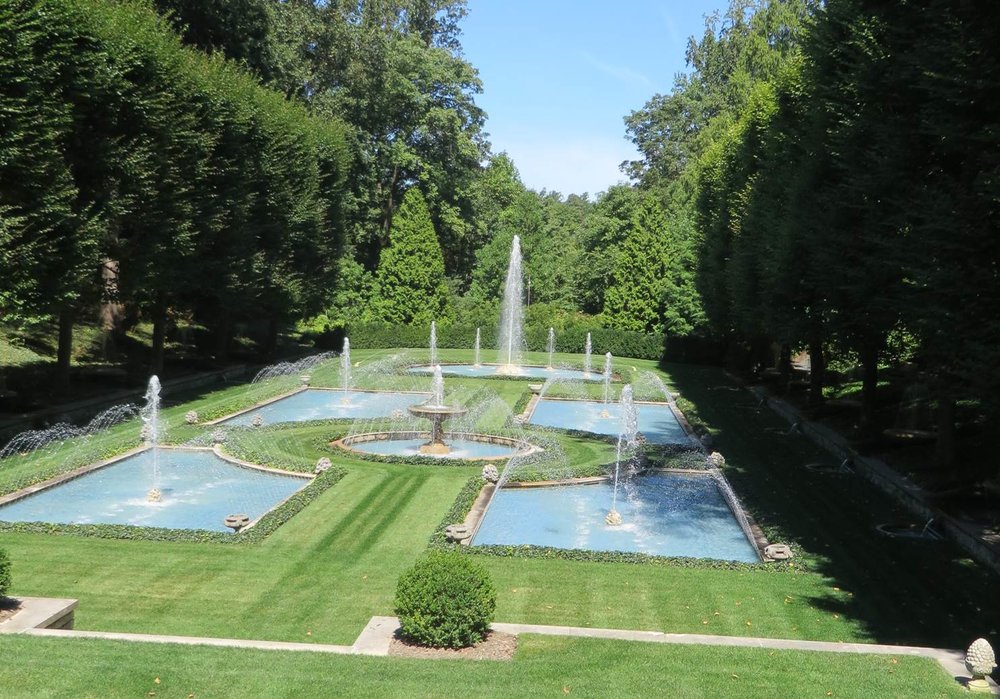
But recently - the Italian Water Garden has been my favorite. Many years ago when we first went to Longwood Gardens, the Italian Water Garden was open and people wandered around on the grass among the fountains. It was beautiful but crumbling. After a renovation, the fountains look much better but the area around the gardens is gated.
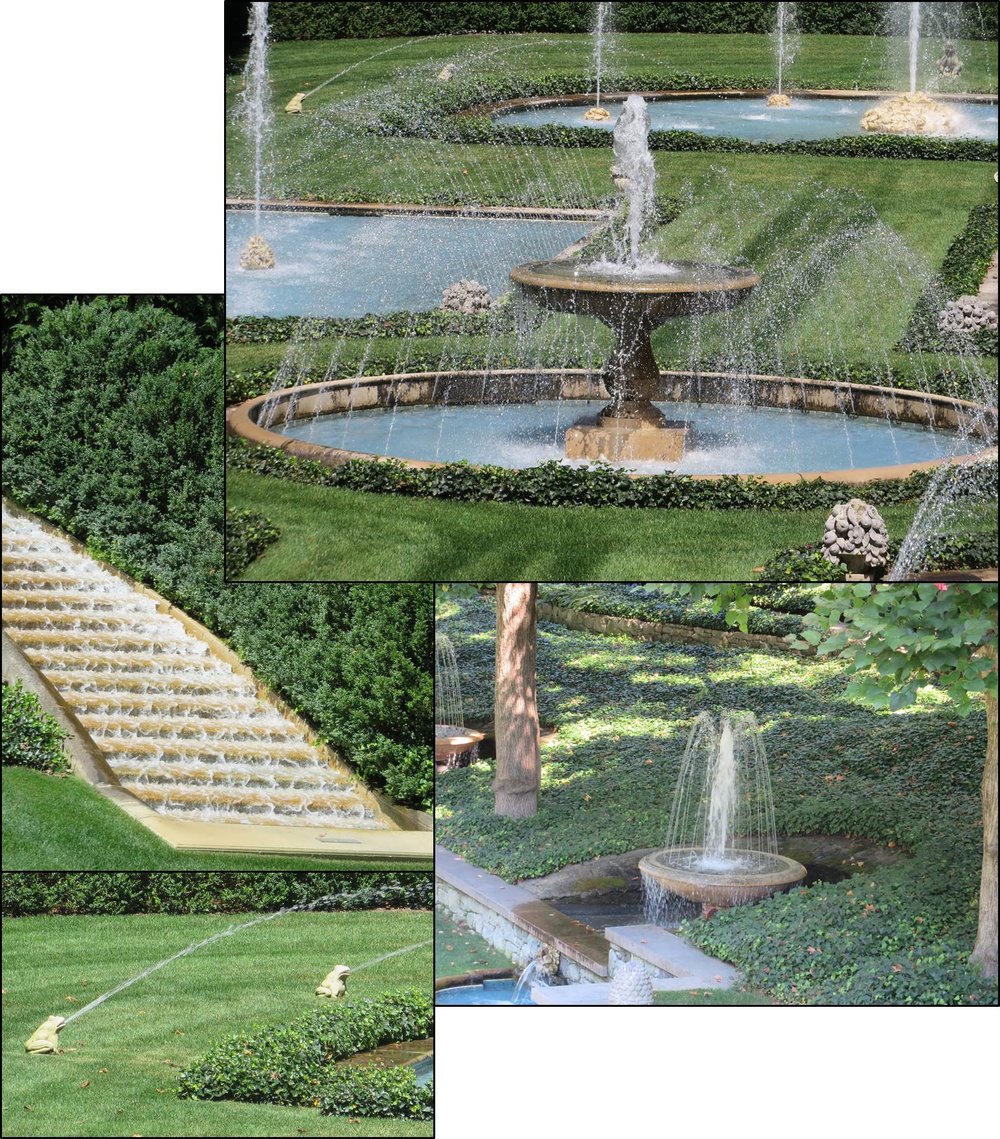
I’ve always liked the water stairs, the large central fountain, the smaller fountains along the edges shaded by trees, and the frogs contributing arcs of water to the fountain at the far end.
There are not enough leaves on the ground yet to make raking worthwhile. My husband chopped up the few around when he mowed the grass - probably for the last time this year. This morning I did the other chores that had accumulated:

Are you done with your fall chores too?

There are always a few ferns that catch my attention in the Longwood Gardens Conservatory. There is a Fern Passage that is lined with them. Usually I am focused on fiddleheads - those tightly curled beginnings of fronds.

This time I noticed one but was almost immediately more interested in the sporangia on the underside of the fronds. This is where the spores are produced that will become the next generation of ferns. The patterns of the fronds and the sporangia have a precision and symmetry that is quite appealing.
 In a short hallway off the fern passage at Longwood Gardens there were planters dense with pitcher plants.
In a short hallway off the fern passage at Longwood Gardens there were planters dense with pitcher plants.
I remember being intensely interested in insectivorous plants when I was in elementary school. They were so different than anything I had ever seen in north Texas where I lived. One year I found some in a catalog and managed to convince my mother to order them for me. I got tiny plants: a Venus Fly Trap and a Pitcher Plant. The Venus Fly Trap did not last very long but the Pitcher Plant endured for about 6 months.
They never got as big as the plants at Longwood and they never flowered. It still is thrilling to see them - and know what they are - in the gardens I visit.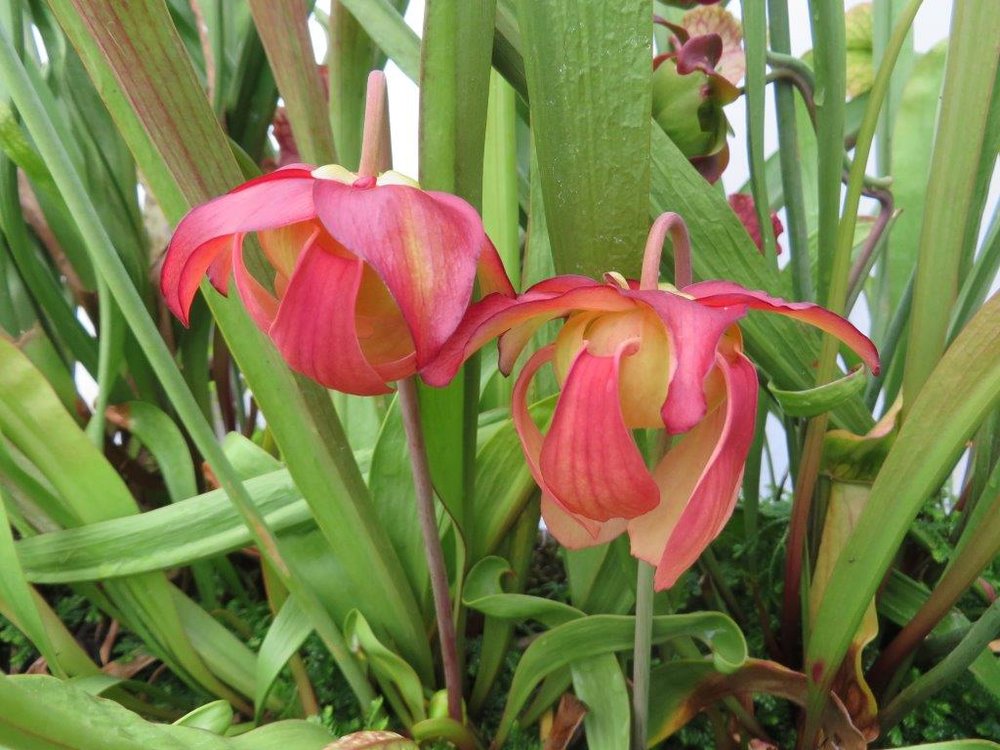
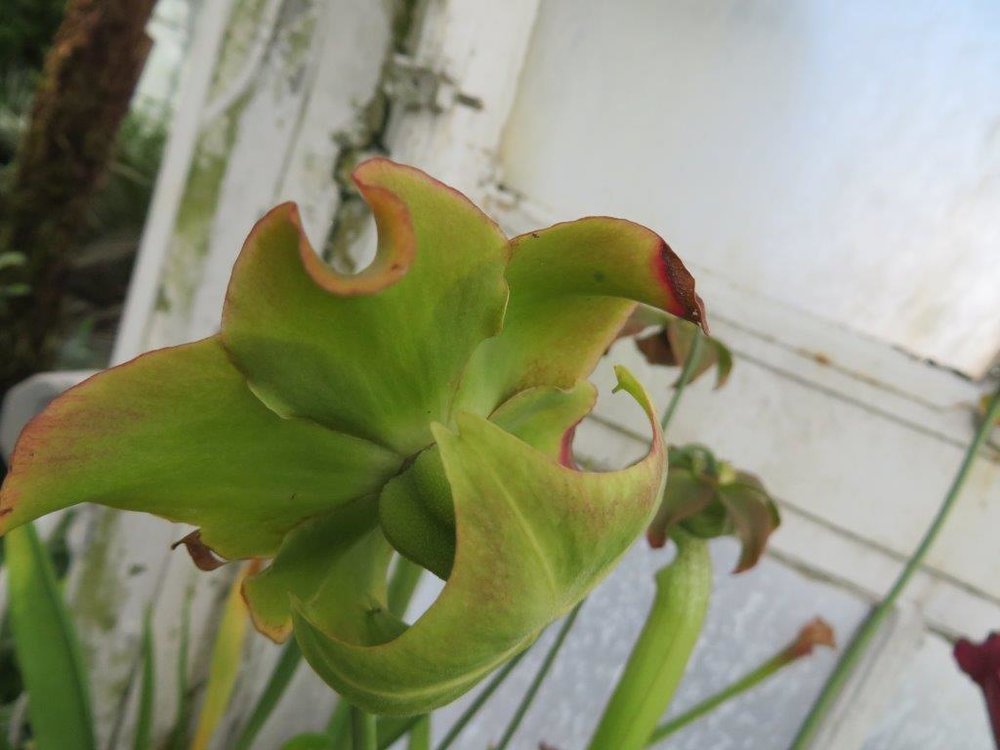
 The Orchid House in the Longwood Gardens conservatory is not large but its walls are full of blooms from floor to ceiling. This time I focused on the slipppers. My favorites are the ones that have dainty slipper toes and trailing ties that I image would tie around an ankle. It isn’t clear how the large striped structure at the back fits into the slipper image….but the whole flower is quite appealing on its thin stalk growing from a base of green leaves.
The Orchid House in the Longwood Gardens conservatory is not large but its walls are full of blooms from floor to ceiling. This time I focused on the slipppers. My favorites are the ones that have dainty slipper toes and trailing ties that I image would tie around an ankle. It isn’t clear how the large striped structure at the back fits into the slipper image….but the whole flower is quite appealing on its thin stalk growing from a base of green leaves.
Which are your favorites? I tend to always take pictures of the green and white ones first.
Celebrating the whole of life....
Thanks for visiting my blog! Enjoy the photo picks from last month:
Copyright © 2025 Gwen Morrison. All rights reserved.
Powered by Squarespace.